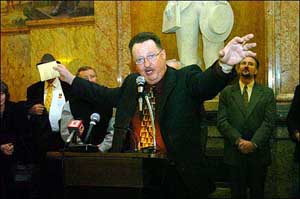-
- Antipathy toward same-sex marriage overwhelmed doubts on amendment
- Feinstein statement on same-sex marriage nets her ‘Pink Brick’ award
- Philadelphia stakes claim as U.S. gay rights birthplace
- Episcopal bishop says he’s falsely accused of suggesting Jesus was gay
- Oregon judge’s civil unions ruling ‘unenforceable’
- Lesbian coach settles discrimination case with Texas school district
- National News Briefs
- World News Briefs
national
Antipathy toward same-sex marriage overwhelmed doubts on amendment
Kansas constitutional same-sex marriage ban passes with 70-percent majority
Published Thursday, 14-Apr-2005 in issue 903
TOPEKA, Kan. (AP) – Opponents argued that amending the Kansas Constitution to ban same-sex marriage wasn’t just about preserving a sacred institution.
They said the change would block or limit health coverage and other benefits for unmarried Kansans, including heterosexuals.
Many Kansans apparently didn’t hear the message, didn’t agree or worried more about potential legal challenges to the state’s long-standing policy of recognizing only marriages between one man and one woman.
They also may have made a larger statement about how they view gays’ and lesbians’ desire for acceptance of their relationships.
“I think they’re seeking approval, endorsement and even promotion of their lifestyle,” said the Rev. Joe Wright, senior pastor at Wichita’s Central Christian Church, a leader of the effort for the amendment. “I think that rubs people as raw as them wanting to get married does. I think most Americans do view it as a perversion.”
The amendment, approved with 70 percent of the vote last week, reaffirms the state’s traditional definition of marriage. It also declares that only those unions are entitled to “the rights and incidents” of marriage.
The debate over exactly what constitutes the rights and incidents of marriage continues.
Some supporters contend the clause only prevents the state from setting up an institution that works like marriage for same-sex couples but is called something else.
Critics believe the amendment will become an excuse for local officials and others to make people’s lives miserable, particularly gays and lesbians. They contend there never was an honest debate.
“Our opponents always wanted to swing it right back around to the morality issue of being gay,” said Bruce Ney, a Lawrence attorney and chair of the anti-amendment group, Kansans for Fairness. “They wanted to talk, basically, about gay sex. It was all about the ick factor.”
Critics could argue the amendment’s approval again demonstrates conservative Republicans’ ability to get their voters to the polls, especially with prodding from clergy.
Turnout was 35 percent. That’s high for an April election in an odd-numbered year, which usually features only city and school board races but far from turnout for statewide general elections in November of even-numbered years.
However, plenty of signs suggested the amendment enjoyed broad support.
In urban areas, alliances of white and minority pastors worked together, as did Catholic leaders and evangelical Protestants. Last November, voters in 13 states approved amendments to their state constitutions, many of them by equally large margins.
Wright believes the Kansas question had support from voters who “maybe never even darken the door of a church.”
Mathew Staver, president of the Liberty Counsel, an Orlando, Fla., group opposing same-sex marriage, said: “When it comes to the same-sex marriage issue, there is a fundamental core reaction of Americans that it’s wrong.”
Joe Solmonese, president of the Human Rights Campaign, a national gay rights group, agrees Americans are concerned about the nation’s moral fiber. He contends fundamentalist Christians and other conservatives scapegoat gays and lesbians.
Solmonese said many conservatives would like to turn the clock back decades and, for example, keep women from working outside the home. But they know such a goal isn’t politically achievable and have focused on a small, vulnerable minority, he said.
“I think they will never stop arguing that the moral fiber of the country is unraveling,” he said.
And Tom Witt, field organizer of Equality Kansas, said his organization was quietly working for gay rights until interrupted by a fight “picked for us.”
But amendment supporters argued they didn’t pick the fight, that gay rights activists did, by challenging traditional definitions of marriage in state courts.
Opponents – including Gov. Kathleen Sebelius – insisted the amendment wasn’t necessary because there is no direct legal challenge to state policy. However, in March, a state trial judge in San Francisco ruled against a California law banning same-sex marriage, undercutting the argument.
“To preserve marriage through the court system, you have to win 100 percent of the time,” Staver said. “The 99 wins you have are undercut by the one loss.”
Kansans for Fairness made its own appeal to voters’ emotions, arguing on signs and in television commercials that the amendment was discrimination and, “It’s just wrong.”
Witt believes if his group had been given more time to educate voters about the amendment’s potential consequences, the margin of approval could have been significantly lower.
Yet Witt and other opponents always faced a huge, if not insurmountable, hurdle. Heterosexual Kansas voters appear to cherish the traditional definition of marriage, even as many of them head to court for divorce hearings.
Staver said: “I think marriage is the line drawn in the sand.”
|
|
Copyright © 2003-2025 Uptown Publications


